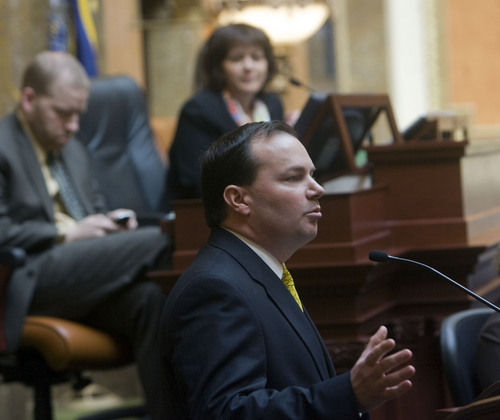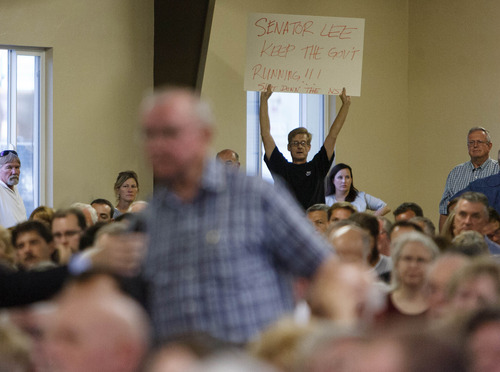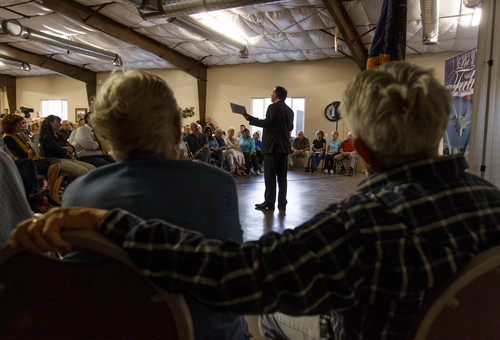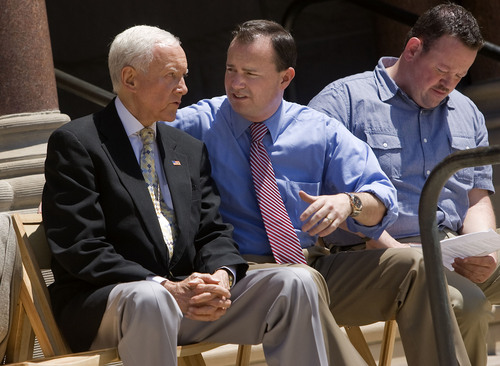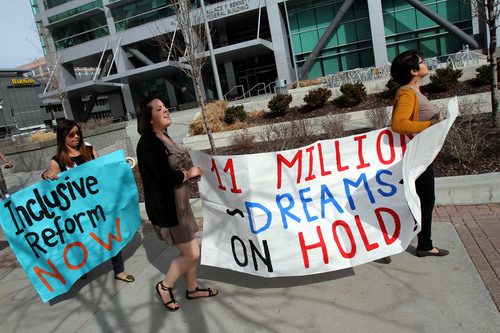This is an archived article that was published on sltrib.com in 2013, and information in the article may be outdated. It is provided only for personal research purposes and may not be reprinted.
On a stage normally reserved for rock stars, Sen. Mike Lee confidently predicted a historic shift that would result in a much smaller government and a much more conservative union.
"Call it the tea party movement, call it the constitutionally limited government movement, call it FreedomWorks, call it whatever you want," he said. "When we started the movement, they ignored us, then a short time later they laughed at us, now they are fighting us, and guess what comes next … we win."
Lee uttered that twist on a famous quote from Mahatma Gandhi on July 5 at a FreedomWorks' rally at West Valley City's Usana Amphitheatre. But who was he referring to when he said, "they are fighting us?"
The answer explains why Lee, elected as Utah's junior U.S. senator in 2010, has emerged as one of the nation's most-polarizing political figures, a man treated like a celebrity by conservative activists, but one who is often criticized by fellow Republicans and vilified by Democrats.
"They" are just as likely to be major players in the Republican Party, such as John McCain, Orrin Hatch and Karl Rove, as they are to be leading Democrats like Barack Obama or Harry Reid.
That doesn't mean Lee isn't a team player, his team just isn't the mainstream Republican Party.
From his first moments in Washington, he has eschewed the standard practice of wooing Senate colleagues to position himself for future rewards. Instead, he's tried to forcibly drag the Republican Party toward his conservative vision, a tactic that has left him isolated within the Senate's GOP caucus and frustrated major sectors of the Utah Republican Party. Polls show his popularity in the state has plummeted.
"He would say the enemy isn't conservative versus liberal; it's not necessarily Republican versus Democrat," said Matt Kibbe, president of FreedomWorks, a tea party umbrella group. "It's the insiders in Washington, D.C., who manipulate the process and game the system, and it's the American people who pay the price for that."
Lee said much the same thing as he championed the political strategy that led to the first government shutdown in 17 years.
In July, after appearing on the Usana stage, Lee vowed to oppose any federal budget bill that funded the Affordable Care Act. While he made little headway in the Senate, he got House Republicans to adopt his plan. The stalemate resulted in a 16-day partial government shutdown that ended when Republicans capitulated to Obama's demands to fund federal functions and avoid a default with no major Democratic concessions in return.
Lee defends his stand as "a fight worth having, and it was no less worth fighting because the outcome was not certain victory." He and his allies blame its failure on the lack of unified Republican support.
Then again, it wasn't there to begin with.
—
GOP infighting • Right from the start, Lee faced heavy criticism from leading party voices such as Sens. McCain, R-Ariz., and Bob Corker, R-Tenn., who said the strategy defied logic since Republicans didn't have the votes to force Obama to undercut his signature health law.
The Republican Party has taken the lion's share of blame for the shutdown — a recent Washington Post-ABC News poll found 63 percent of Americans disapproved of the GOP, a historic low. That has only fed the criticism leveled at Lee and his allies, including Sen. Ted Cruz, R-Texas.
"He's getting kicked around," said Spencer Stokes, Lee's former Senate chief of staff. "This has been a really hard battle on him. You can only imagine the constant barrage you would take. He's over interacting with his colleagues every day, and there are a fair amount of Democratic senators who are very irritated with him, and there are a fair amount of Republican senators who don't like that they were put in this awkward position."
Lee told The Salt Lake Tribune he isn't worried about the hard feelings, which still exist, dismissing them as a fight over tactics, not principles. He isn't backing down either. It goes against the grain of a guy who expects ideological loyalty from his staff and has been known to call more moderate Republicans "squishes." He often reminds people that "ultimately, we don't work for a party. We work for the people who elected us."
"Tension among and between Republican senators is natural, it's unavoidable and it leads to meaningful and helpful dialogue," Lee said. "On the other hand, we have to remember that the lack of tension sometimes can lead to bad decisions."
He said Republicans have been too eager to work with Democrats in the past, producing a nation with $17 trillion in debt and a government he believes is far too large.
"It's collusion even more than conflict that often presents the problem," he said.
Combative stances attacking conservatives who disagree with him have helped expand the rift in the Republican Party, both in Utah and in Washington, D.C. Traditional party power sources say following such an absolutist view, as Lee espouses, would lead to electoral ruin.
"You have to decide if you would rather achieve short-term victories on your way to a larger goal or fall on your sword every time," said Brian J. Walsh, a former National Republican Senatorial Committee strategist.
"There are many states in this country that are not nearly as red as a state like Utah or a state like South Carolina. For Republicans to win the White House in 2016, you need a coalition," Walsh said.
The national Republican Party didn't help elect Lee. He came to power with assistance from far more conservative outside groups such as the Senate Conservatives Fund, FreedomWorks and Club for Growth. Their ideological union has been absolute.
Not once has Lee disagreed with FreedomWorks on a vote included in its annual scorecards. Neither has Cruz. No other senator can say that.
No senator has higher marks with Heritage Action in the past three years, a group now led by former Sen. Jim DeMint, R-S.C., who used to be the brainpower behind the Senate Conservatives Fund.
"[Lee's] not going to have a big piece of landmark legislation with his name on it during this administration," DeMint said in an interview. "But Mike has been essential in showing people around the country that there are some people in Washington that are standing up for the things they believe in."
Kibbe, of FreedomWorks, said Lee has found his fight a little lonely, discovering his fellow conservatives don't have his back. "He is trying to figure out how to move the dinosaurs in Washington to actually solve problems."
—
Growing frustration • In deep red Utah, there's growing frustration that Lee has put ideology above practical governing, a criticism coming from two state senators — one Democrat and one Republican.
State Sen. Jim Dabakis, D-Salt Lake City, who is also the state Democratic Party chairman, said, while he normally disagrees with Hatch and former Sen. Bob Bennett, "I never had any second thoughts on where their heart was. It was in serving the people of Utah. I don't think that is true of Mike Lee. He's there to serve his tea party ideology."
Said state Sen. Todd Weiler, R-Woods Cross: "The shutdown was the culmination of the fact that Mike Lee is more interested in representing the tea party than the good people of the state of Utah."
Lee rebuffs such claims, saying he was elected in a statewide contest and had persistently explained he would take a more combative approach to Washington.
"The people of Utah elected me, and I'm doing exactly what I told the people of Utah I would do when I ran," he said, "so I am, by definition, representing their interests."
Lee noted that Weiler was among state lawmakers who approved a resolution asking Utah's congressional delegation to use "all means possible" to combat Obamacare.
Weiler, who met Lee when they were law students at Brigham Young University, didn't support his friend in the 2010 party primary, partly because of Lee's rigid rhetoric.
"I respect his political ideology," the GOP state senator said, "but at some point there has to be a dose of reality."
And Weiler was among those who simply didn't believe Lee was as conservative as he portrayed himself to be.
"There was lots of thought that he was using the tea party as a vehicle to get elected and once he got in there, he would moderate," Weiler said. "Instead, he has doubled down on the far right side of things."
—
Election mandate • Stokes, a lobbyist who splits his time between Utah and Washington, often hears criticism similar to Weiler's from the state's political elite — officeholders, donors, operatives.
"I don't go anywhere where I don't get asked the Mike Lee question," he said. "I get asked what he's doing? Will he be able to get re-elected? People talk about who is running against him. I always start by chuckling because I ask people, 'What did you think Mike Lee was going to do?' "
He dismissed the criticism, saying it's just Utahns' passive aggressiveness. "We in Utah don't like confrontation."
Lee's former state director, Dan Hauser, has taken to Twitter and Facebook to do just that, confronting critics such as Weiler, calling them "political opportunists" who are "piling onto the senator because other Republicans in Washington, D.C., torpedoed his strategy."
Hauser did say Lee could have improved his communication with "thought leaders" in Utah, while Lee said he "made every effort to" reach out to people in the state. That included a town hall tour of rural Utah, where night after night he was greeted with standing-room-only crowds of ardent supporters who cheered him on for fighting — even if victory was unlikely.
For some regular voters, Lee's anti-establishment efforts are what's needed.
"When you go to Washington, you think you're going to do good things, but you end up falling in line with the old guys who have been there for a long time — half their lives — and know the situation and how to work it. Lee hasn't," said Zelma Jeppsen of Mantua, an independent voter who supported Lee in 2010.
Michelle L. King of the Cache Valley Tea Party remains a major supporter of Lee, particularly the senator's skepticism toward government surveillance programs. She argues Lee deserves more time.
"I always expected it would be a long road. I knew he would not have a lot of help in the Senate," she said. "We need to be patient to see long-term change for the better."
Utah business leaders, a longtime force in the GOP, believe Lee is standing in the way of needed change on issues such as immigration and has hurt the economy with this strategy that led to the shutdown.
World Trade Center Utah President Lew Cramer was disappointed when Lee withdrew from immigration negotiations and then opposed legislation business leaders say they need to compete globally.
"You've got to be in the room to be a part of the game," Cramer said. "This nation is built on compromise. The Constitution was built on compromise. Marriage is built on compromise. Everybody can have principles, that's terrific, but we need solutions."
Stokes said it is a systemic problem, in which a tea-party call for a far-more-limited government butts up against the desires of business leaders.
"He never had a relationship with the business community. There was nothing there to deteriorate," Stokes said. "Mike has been working to have a relationship with them, but this is a group of people who don't want a relationship with Mike."
—
Waiting in the wings • Lee still has the tea party but is losing support outside of it. His popularity has plunged, with a recent poll by BYU political scientists measuring his approval rating at 40 percent, remarkably low for Utah.
Many view a proposed change in the state's unique nominating system as a slap at the junior senator.
Organizers for Count My Vote, which is promoting a ballot proposal to replace the caucus and convention system with a primary, say their goal is more voter participation and not, in any way, a reaction to Lee. But some of those organizers confide that donors to their efforts see the proposed change as a way to defeat Lee in the long term, muting the effect of his tea party followers in GOP nomination fights.
Some ambitious young Republicans have circled Lee for some time with 2016 on their minds.
Leading the group is Thomas Wright, a former state party chairman, and Dan Liljenquist, a one-time state senator who challenged Hatch in 2012. Other candidates could emerge as well.
Liljenquist blasted Lee in his Deseret News column, saying the senator lost credibility in the shutdown fight.
Wright, who has stayed largely out of the fray, told The Tribune the senator's strategy may have lasting results.
"I'm just as concerned about Obamacare as Senator Lee is, but he burned bridges, and when you burn bridges, you can't bring results. Leaders are ultimately judged by their results."
Wright, who runs a real estate firm in Park City, said he's considering the race but doesn't view himself as Lee's opponent today. "I want him to have more success in the next three years than he had in the first three," Wright said.
Lee said the prospect of a challenge won't change how he operates.
"When that election cycle rolls around, I will confront whatever challenges I face," he said. "In the meantime, my focus is doing what I promised Utahns I would do when I ran for office in 2010."
So Lee plans to keep fighting — until he wins.
Join us for a Trib Talk
O Monday at 12:15 p.m. • Jennifer Napier-Pearce talks with Mike Lee's former chief of staff, Spencer Stokes, conservative blogger Holly Richardson and Tribune Washington correspondents Matt Canham and Thomas Burr about what motivates Utah's junior senator and what the recent debacle will mean for Lee's political future. Join the discussion at sltrib.com.


